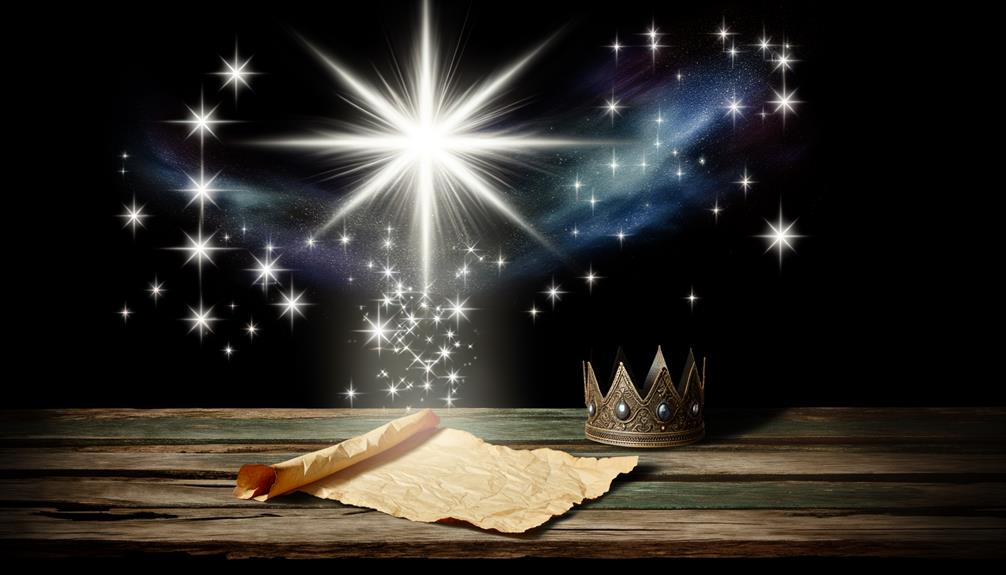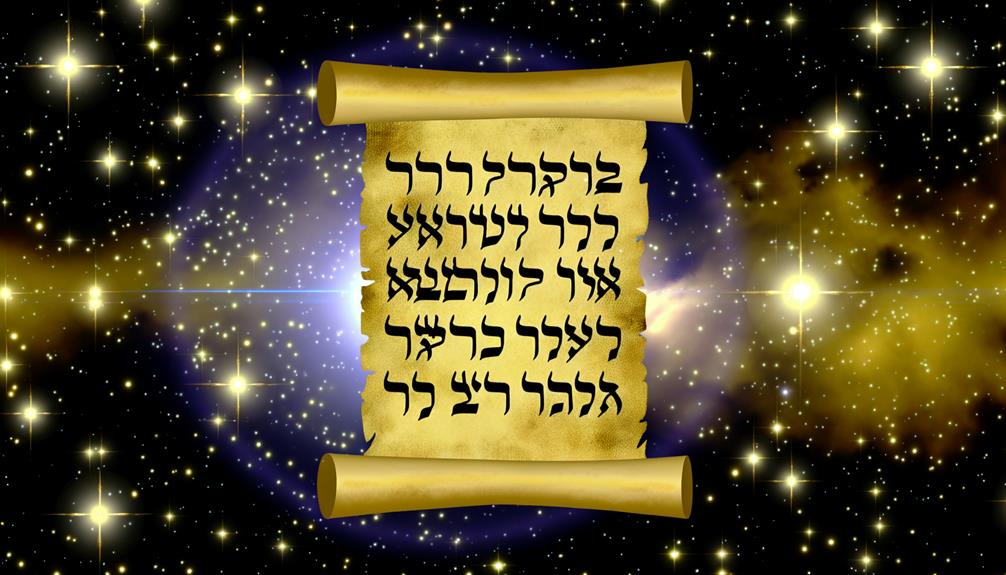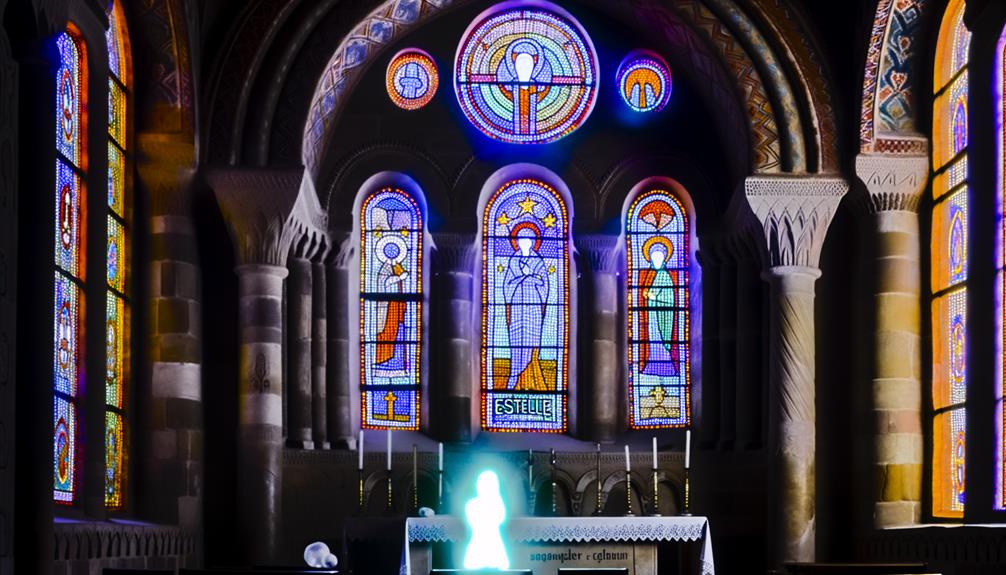Meaning of Estelle in the Bible: Name Significance
In the Bible, the name Estelle, deriving from the Latin “stella” meaning “star,” symbolizes divine illumination and celestial guidance. Stars in Scripture often represent God’s presence, prophetic revelations, and covenantal faithfulness.
They guide, as seen with the Star of Bethlehem leading the Magi, and signify divine promises, such as Abraham’s descendants being as numerous as the stars. This profound symbolism underscores hope, guidance, and unyielding divine favor.
Delving deeper into the biblical narratives and traditions connected to stars reveals richer layers of spiritual insight and theological significance.

Biblical Meaning of the Name Estelle: Origins and Symbolism
| Aspect | Details |
|---|---|
| Name Origin | Latin and Old French (from “Stella” meaning star) |
| Biblical Reference | Not directly mentioned in the Bible |
| Spiritual Symbolism | Light, divine guidance, hope |
| Religious Connection | Often associated with stars in Christian symbolism |
| Related Bible Concepts | Star of Bethlehem, guiding light, promise of God |
Etymology of Estelle

The etymology of the name Estelle, derived from the Latin word ‘stella’ meaning ‘star,’ provides a profound insight into its celestial connotations and symbolic significance within a biblical context.
The term ‘stella’ encapsulates a sense of divine illumination and guidance, resonating with numerous biblical references to stars as symbols of God’s promises and presence.
Historically, stars have been seen as markers of divine intervention and messengers of celestial events, such as the Star of Bethlehem heralding the birth of Christ.
Textual analysis reveals that the name Estelle invokes themes of hope, guidance, and divine favor.
Consequently, Estelle carries with it a legacy of spiritual enlightenment, underscoring its profound resonance within the tapestry of biblical symbolism and tradition.
Biblical Themes of Light

Light, often depicted as a divine presence and a symbol of purity, plays a central role in biblical narratives and theological discourse. The motif of light begins in Genesis with God’s command, ‘Let there be light’ (Genesis 1:3), symbolizing the inception of creation and divine order.
Throughout Scripture, light is repeatedly employed to signify God’s guidance, truth, and righteousness. For instance, Psalm 27:1 proclaims, ‘The Lord is my light and my salvation,’ emphasizing divine protection and illumination.
In the New Covenant, Jesus is described as the ‘light of the world‘ (John 8:12), reflecting the messianic fulfillment of Old Covenant prophecies. Consequently, light serves as a profound symbol of God’s presence and redemptive power in biblical theology.
Star Imagery in Scripture

Star imagery in Scripture serves multifaceted roles, from symbolizing divine guidance to marking prophetic revelations.
Historically, stars have been seen as celestial markers that not only guide the faithful, as in the story of the Magi, but also signify God’s overarching sovereignty and presence.
Textual analysis of prophetic references, such as in the Book of Numbers and Revelation, highlights stars as metaphors for pivotal leaders and messianic hope.
Biblical Star Symbolism
Throughout Scripture, celestial imagery frequently serves as a profound symbol of divine guidance, revelation, and the promises of God to His people.
Stars, in particular, hold significant theological weight, often representing God’s covenantal faithfulness and the illumination of His truth.
For instance, in Genesis 15:5, God promises Abraham that his descendants will be as numerous as the stars, signifying an unbreakable divine pledge.
The star that led the Magi to Jesus in Matthew 2:2 further exemplifies this symbolism, heralding the fulfillment of divine prophecy and the revelation of the Messiah to the Gentiles.
This celestial motif underscores God’s omnipresence, His eternal covenant, and His role as the ultimate guide and light for humanity.
Stars as Divine Guidance
In biblical literature, celestial imagery frequently functions as a potent symbol of divine guidance, with stars often depicted as instruments through which God communicates His will and direction to His people. This symbolism is deeply rooted in the theological framework and historical context of Scripture.
The Star of Bethlehem guided the Magi to the birthplace of Jesus (Matthew 2:1-2).
Abraham’s descendants were compared to stars, symbolizing divine promise (Genesis 15:5).
The heavens declare the glory of God and His handiwork (Psalm 19:1).
Stars serve as signs for seasons and markers of sacred time (Genesis 1:14).
These references underscore the role of stars as divine agents, illuminating paths both physically and spiritually in biblical narratives.
Prophetic Star References
Prophetic literature in the Bible frequently employs star imagery to symbolize divine revelation and future events, emphasizing the cosmic significance of God’s plans.
For instance, Numbers 24:17 prophesies, ‘A star will come out of Jacob; a scepter will rise out of Israel,’ foretelling the rise of a messianic figure.
Similarly, Isaiah 14:12’s reference to the ‘morning star’ has been linked to the fall of Babylon and has eschatological implications.
The star of Bethlehem in Matthew 2 guided the Magi to Christ, underscoring divine guidance and fulfillment of prophecy.
These instances reveal that stars in prophetic texts serve as markers of significant divine intervention, linking celestial phenomena with terrestrial destiny and underscoring God’s sovereignty over history.
Estelle and Divine Guidance

How does the name Estelle reflect the concept of divine guidance as seen in biblical texts?
The name Estelle, derived from the Latin ‘stella’ meaning ‘star,’ encapsulates themes of divine guidance that are prevalent throughout the Bible. Stars often symbolize God’s direction and providence, as seen in various scriptural narratives.
- Abraham’s promise: God used stars to signify Abraham’s numerous descendants (Genesis 15:5).
- Bethlehem star: Guided the Magi to the birthplace of Jesus (Matthew 2:9-10).
- Heavenly signs: Stars as signs of God’s celestial messages (Revelation 12:1).
In this context, Estelle embodies the multifaceted ways divine guidance is manifested in biblical texts.
Symbolism of Stars

The symbolism of stars in biblical narratives often represents divine guidance and heavenly authority, as seen in the story of the Star of Bethlehem leading the Magi to the Christ child.
Historically, stars have been interpreted as celestial markers of God’s covenant and promises, underscoring their significance in the biblical text.
This dual role as navigators and divine signs highlights the theological depth and historical context in which stars are entrenched within the scriptures.
Stars in Biblical Narratives
Stars in biblical narratives often serve as profound symbols, representing divine guidance, prophetic revelation, and the fulfillment of God’s promises.
In these sacred texts, stars are imbued with rich theological significance, serving various narrative purposes. For instance, in the story of Abraham, the stars symbolize God’s promise of countless descendants (Genesis 15:5).
Similarly, the Star of Bethlehem guides the Magi to the birthplace of Jesus, signifying divine direction (Matthew 2:2).
- Divine Guidance: Stars often lead characters to significant spiritual or physical destinations.
- Covenantal Promises: Stars symbolize God’s enduring commitments to His people.
- Prophetic Revelation: Stars can signify forthcoming events or divine interventions.
These examples underscore the multifaceted roles stars play in biblical literature.
Stars as Divine Signs
Building upon the narrative roles of stars, their function as divine signs further accentuates their symbolic weight within the biblical canon. Throughout Scripture, stars are frequently depicted as celestial markers of divine intervention.
The Star of Bethlehem, guiding the Magi to the birthplace of Jesus (Matthew 2:1-12), exemplifies this. Historically, stars served as navigational beacons, symbolizing divine guidance and revelation.
Textually, stars signify God’s omnipotence and sovereignty over creation, as seen in Genesis 1:16, where they are created to ‘give light on the earth.’ Additionally, prophetic literature, such as in Daniel 12:3, portrays the righteous as stars, illuminating the eschatological hope.
Consequently, the symbolism of stars as divine signs underscores their integral role in expressing theological truths and divine mysteries.
Virtues Reflected in Estelle

Estelle, derived from the Latin word ‘stella’ meaning star, embodies virtues such as hope, guidance, and divine illumination, which are deeply embedded in biblical narratives. These virtues are consistently illustrated through various scriptural accounts where celestial phenomena serve as metaphors for divine presence and direction.
Key biblical figures often interpret stars as symbols of God’s promise and covenant, providing a constant source of hope and reassurance.
- Hope: Stars symbolize the unyielding hope in God’s promises.
- Guidance: Celestial bodies often guide the faithful, as seen with the Magi.
- Divine Illumination: Stars represent divine wisdom enlightening the faithful.
These virtues collectively reflect the theological significance of Estelle.
Estelle in Christian Tradition

In Christian tradition, the name Estelle, interpreted as ‘star,’ has been associated with the Virgin Mary, often revered as the Star of the Sea (Stella Maris), symbolizing guidance, protection, and divine intercession.
This title for Mary has its roots in early Christian hymns and prayers, reflecting her role as a beacon of hope and a navigator for the faithful amid life’s tumultuous seas.
Historical texts, such as the writings of Saint Jerome, highlight this imagery, portraying Mary as a luminous star leading believers towards Christ.
Theologically, this symbolism underscores the intercessory power attributed to Mary, reinforcing her position as a mediator between humanity and the divine, a notion deeply embedded within Christian devotion and liturgical traditions.
Modern Interpretations of Estelle

While historical Christian tradition venerates Estelle as a symbol of divine guidance through Mary, contemporary perspectives explore the name’s spiritual and cultural resonance in modern faith practices.
Modern interpretations often reflect a broader theological and cultural appreciation:
- Interfaith Symbolism: Estelle is seen as a bridge between Christian and Jewish traditions, reflecting themes of hope and divine favor.
- Feminist Theology: The name is embraced in feminist circles as a representation of female empowerment and divine wisdom.
- Spiritual Renewal: Estelle symbolizes personal and communal renewal, resonating in liturgical and devotional contexts.
These interpretations enrich the biblical understanding, highlighting its relevance today.
Conclusion
Ironically, while ‘Estelle’ may not explicitly appear in the biblical text, its meaning, ‘star,’ illuminates the profound biblical themes of divine light and guidance.
The celestial imagery woven throughout scripture underscores a divine order that Estelle symbolically reflects.
As stars have historically been navigational beacons, so too does Estelle embody virtues of guidance and hope.
Consequently, Estelle’s modern interpretations continue to shine brilliantly, echoing a sacred tradition that transcends time and text.






